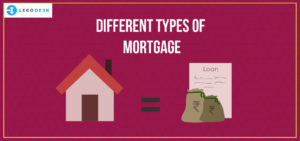Different types of Mortgage

Section 58 of the transfer of property act, 1882 defines as
“A mortgage meaning is the transfer of an interest in a specific immovable property for the purpose of securing the payment of money advanced or to be advanced by way of loan, an existing or future debt, or the performance of an engagement which may give rise to a pecuniary liability.
The transferor is called a mortgagor, the transferee a mortgagee; the principal money and interest of which payment is secured for the time being are called the mortgage-money, and the instrument (if any) by which the transfer is effected is called a mortgage-deed.”[1]
Read Also: Mortgage: A Short Note
Parties and terms
- Mortgagor and Mortgagee: The one who gives for the mortgage or the transferor is called the mortgagor. The one to whom it is given or who accepts mortgage is called a mortgagee.
- Agreement: This is the legal document which specifies the terms conditions, duties and obligations.
- Money: The amount (principal + interest) which is involved called as mortgage money.
Essentials of a mortgage
- Immovable property
- Consideration: The consideration may be the performance of contact, discharge of a debt or money advanced as a loan.
- There should be a transfer of interest: The interest in the property should be transferred for an effective mortgage.
6 Different Types Of Mortgages
-
Simple mortgage (Section 58(b))
- The mortgaged property is not transferred from the mortgagor to the mortgagee i.e. there is no delivery of the possession. So, the mortgagor transfers the right to sell the immovable property.
- The mortgagor enjoys the right of usufruct (enjoy the benefits of the property).
- Failure of the mortgagor to pay the loan amount back gives a right to the mortgagee to sell the property so mortgaged and with the proceeds of the sale recover the amount of the loan advanced.
- The mortgagor must have personally bound himself for the repayment of the loan. (Personal Security).
- The mortgagee has no right of foreclosure in the property.
-
By conditional sale (Section 58(c))
- In this kind of mortgage, there is an ostensible sale of mortgaged property by the mortgagor. This mortgage was legally enforced in India for the first time through the Bengal Regulation Act, 1978.
- The ostensible sale takes place on the basis of three conditions: if the mortgage money is not paid on a certain date, the sale shall become absolute; or if such payment is being made, the sale shall become void; or on the condition that after the payment of money is completed successfully, the buyer shall transfer the property back to the seller.
- The sale should be ostensible one i.e. apparent in nature. The mortgagee is titled as “mortgagee by conditional sale”.
- Mortgagee does not get the right of sale over the property and gets a right to foreclosure in the property.
- There must be a document which affects the sale, else such mortgage is not held to be valid.
-
Usufructuary mortgages (Section 58(d))
- The mortgagor delivers possession (Expressly or impliedly) of the immovable property to the mortgagee and sanctions the mortgagee to enjoy the profit until the loan is repaid. Therefore, the benefits of the property are enjoyed by the mortgagee.
- Enjoying the property includes receiving rents and profits with respect to interest amount or loan amount or both.
- The title of the property is with the mortgagor.
- The mortgagor is not entitled to provide for any personal security.
-
English mortgages (Section 58(e))
- The mortgagor essentially declares to be repaying the loan amount on a particular date.
- The mortgage takes effect by transfer of the property to the mortgagee absolutely but with the condition of retransfer of the property in case the amount is repaid by a certain date.
- Mortgagor binds himself personally for the repayment of the loan.
- Mortgagor transfers the right of title, possession, usufruct to the mortgagee. The right of foreclosure is not transferred to the mortgagee.
-
By Deposits of title deeds (Section 58(e))
- This type of mortgages is valid in towns of Kolkata, Mumbai, Madras and in any other town where the State government notifies by publication.
- The mortgagor delivers to the mortgagee the document of title of immovable property with the intent to create a security.
- There needs to be a debt, the security for the debt should be by the deposit of title deed.
- Section 96 of the Transfer of Property Act, 1882, gives mortgage by deposit of title deed the same meaning as that of a simple mortgage.
-
Anomalous mortgage (Section 58(f))
This is a kind of mortgage which does not fall in any of the above categories can be a combination of two or more types of mortgages.
[1] Section 58 of the Transfer of Property Act, 1882
Try our Debt Resolution solutions today Request a Demo